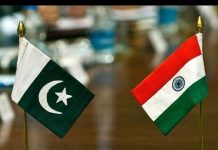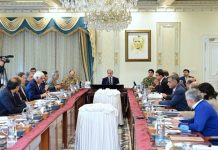From Abid Usman
LAHORE: General (retired) Pervez Musharraf filed a petition with the Lahore High Court on Friday challenging the verdict by a special court in Islamabad in the high treason case against the former dictator for imposing a state of emergency in the country on November 3, 2007. On December 17, a special court in Islamabad found Musharraf guilty of high treason and handed him a death sentence under Article 6 of the Constitution. The verdict marked the first time in Pakistan’s history that a military chief was declared guilty of high treason and handed a death sentence. The 86 page-long petition, filed by Advocate Azhar Siddique on Musharraf’s behalf, named the federal government and others as respondents. A full bench, chaired by Justice Mazahir Ali Akbar Naqvi, will hear the petition on January 9, 2020. The petition highlighted that the “judgement contained a mix of anomalies and contradictory statements”. It added that the special court “rapidly and hurriedly wrapped up the trial which was far from conclusion”. “The special court […] announced an award of capital punishment to the applicant without examining the accused under Section 342 of the Criminal Procedure Code (power to examine the accused). The importance of examining the accused in a criminal trial is enormous and any lapse, failure or omission to fulfill this requirement adversely affects the prosecution case. “A criminal trial cannot simply [be] complete without adhering to this mandatory legal requirement.” The petition stated that the special court “has not taken into consideration that no actions detrimental to national interest were taken by the applicant” as “no offence of high treason is made out from the evidence presented against him [Musharraf] before the special court”. The petition also challenged the verdict’s graphic paragraph 66 which read: “We direct the law enforcement agencies to strive their level best to apprehend the fugitive/convict [Pervez Musharraf] and to ensure that the punishment is inflicted as per law and if found dead, his corpse be dragged to the D-Chowk [in front of the Parliament House], Islamabad, Pakistan, and be hanged for three days”. The petition states: “The Honourable respective president of the special court has crossed all religious moral, civil and constitutional limits, while ruthlessly, irreligiously, unlawfully, unrealistically awarding a debilitating, humiliating, unprecedented and against the dignity of a person sentence […] through para 66.” Earlier this month, Musharraf had filed an application in the LHC, urging it to halt the special court from sentencing him in absentia. In the petition, the former dictator had challenged the formation of the special court holding his trial under charges of high treason and legal flaws committed in the procedure. Three days after he had filed the petition, Musharraf, who is currently abroad, was handed the death penalty by the special court in Islamabad after the three-member bench convicted him in the treason case.
A day after the special court handed him death sentence, Musharraf expressed his gratitude to the armed forces and the people of Pakistan “for remembering his services for the nation”. In a video that showed him lying on a medical bed, Musharraf said he had “faith in Pakistan’s judiciary that they will provide me justice and keep in view the supremacy of law”. General (retd) Pervez Musharraf on Friday challenged a special court’s verdict sentencing him to death in a high treason case in the Lahore High Court (LHC). The petition was filed by AzharSiddique on behalf of Musharraf in the LHC. The special court on December 17 had sentenced the former military ruler to death for imposing a state of emergency on November 3, 2007 and suspending the Constitution. The petition stated that Musharraf was not given a chance to present his arguments and that the “special court quite abruptly and hurriedly wrapped up a trial that was far from its conclusion.” “The hastily announced judgment is emanating from a prosecution case which suffers, for all intents and purposes from an admitted, noticeable and unexplained delay of over five years from the date of the alleged offence and initiation of proceeding,” the petition stated. “The then government, by failing to follow the mandated procedure laid down in Section 5 (1) of the Special Courts Act, 1976, lodged the complaint against the applicant in an unlawful manner. Therefore, the complaint against the applicant is void ab initio. The law clearly prescribes that the special court shall only commence proceedings once a complaint of high treason is completely filed by the ‘federal government’.” The petition also challenged paragraph 66 of the special court’s verdict, which read, “We direct the law enforcement agencies to strive their level best to apprehend the fugitive/convict and to ensure that the punishment is inflicted as per law and if found dead, his corpse be dragged to the D-Chowk, Islamabad, Pakistan, and be hanged for three days”.
“The honourable respective president of the special court has crossed all religious moral, civil and constitutional limits, while ruthlessly, irreligiously, unlawfully, unrealistically awarding a debilitating, humiliating, unprecedented and against the dignity of a person sentence,” the petition stated. “The wordings in paragraph 66 of the impugned judgement, although holding minority view, are still an exercise of languages which directly violates Article 2 of the code of conduct to be observed by the judges,” the petition read. It added that Justice Nazar Akbar in his dissenting note had mentioned that the actions taken by Musharraf on November 3, 2007 can be termed illegal and unconstitutional but they cannot be tantamount to treason. “Article 6 of the Constitution had introduced the definition of treason via the 18th Amendment on April 20, 2010, while the crimes in question had occurred in 2007. “One cannot conclude that the emergency of Nov. 3, 2007 was ‘subversion’ or ‘abrogation’ of the Constitution. Neither the Constitution was replaced by any Legal Framework Order nor even the basic structure of the Constitution has been changed.” “The importance of examining the accused in a criminal trial is enormous and any lapse, failure or omission to fulfill this requirement adversely affects the prosecution case” The special court did not take “into consideration that no actions detrimental to the national interest were taken by the applicant”.



